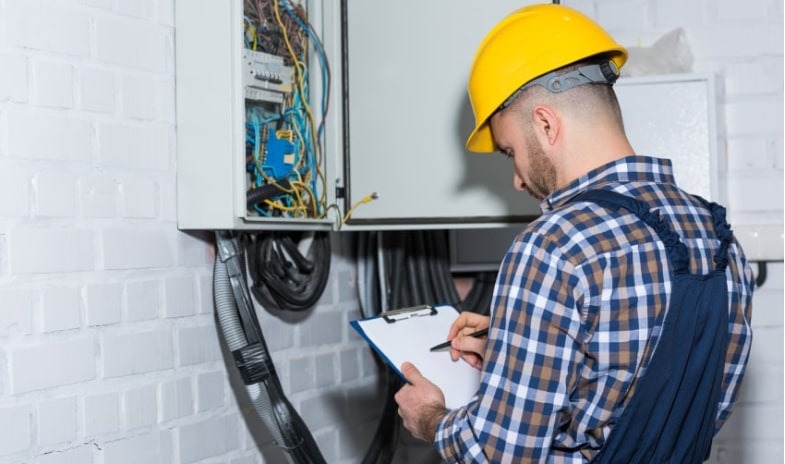The electrical panel in your home or business is more important than most people realize. It functions as the heart of the system, distributing power safely to every outlet, appliance, and light. Over time, however, panels wear down, become outdated, or simply can’t keep up with growing energy demands. These issues are often overlooked until they become unavoidable problems. We will explore how to identify when your electrical panel needs to be replaced, why timely upgrades matter, and how Falcon Electric ensures that when the moment arrives, the process is smooth and stress-free.
Recognizing the Warning Signs and the Benefits of Acting Early
One of the most common issues people face with their electrical panels is constant breaker trips. If you’ve noticed this happening frequently, it’s a clear sign your panel is struggling. Flickering lights, unusual buzzing sounds, or scorch marks around outlets can also indicate deeper problems that require attention. Another clue is the age of your panel. Many older homes and commercial spaces still rely on panels installed decades ago, which were never designed to handle today’s electronics, appliances, or heating and cooling systems.
If your panel still uses fuses instead of breakers, that is another red flag. Consulting a qualified Electrician at this stage ensures the issue is properly evaluated before it turns into a major safety concern. Delaying action when these signs appear increases the risks of electrical fires, damaged appliances, and higher energy bills. By acting early, you not only prevent hazards but also improve efficiency, protect your property, and gain the peace of mind that your electrical system is working as it should.
Why Postponing Panel Replacement Creates Bigger Risks
Electrical systems are built with safeguards, but they can only do so much when the panel is outdated or overworked. Postponing replacement creates hidden dangers that can escalate quickly. Overheated wiring, overloaded circuits, and loose connections increase the likelihood of electrical fires, which often happen without warning. Beyond safety, outdated panels put your expensive appliances and sensitive electronics at risk. Power surges or uneven distribution of electricity can shorten their lifespan or even destroy them outright.
Homeowners and business owners may also face higher insurance premiums or even loss of coverage if inspections reveal an unsafe panel. In the long run, postponing the inevitable often costs far more than addressing the problem directly. A panel replacement may feel like an investment, but when weighed against potential property damage, safety hazards, or insurance complications, it becomes clear that delaying only magnifies the risks and expenses down the road.
The Advantages of Upgrading to a Modern Electrical Panel
Upgrading your electrical panel offers a wide range of advantages that go far beyond safety. A modern panel is designed to handle today’s high energy demands, from multiple smart devices and appliances to advanced heating and cooling systems. With an updated system, you no longer have to worry about overloaded circuits or the inconvenience of resetting breakers constantly. Another benefit is the flexibility it provides for future upgrades. If you’re considering renovations, an electric vehicle charger, or solar panels, a modern panel ensures your system is ready.
Energy efficiency is also improved, since newer panels distribute power more evenly, minimizing wasted electricity. This not only lowers utility bills but also helps protect valuable electronics from sudden surges. Perhaps most importantly, replacing your panel gives you confidence that your property is compliant with current safety codes, making inspections smoother and adding to long-term property value.
How Falcon Electric Ensures a Smooth Transition
Replacing an electrical panel may sound intimidating, but electricians make the process far less stressful. Their approach focuses on clear communication, efficiency, and minimizing disruption for property owners. From the first inspection, they provide a clear understanding of what needs to be done and why, avoiding unnecessary confusion. During installation, the process is carefully managed to ensure safety and accuracy, while also keeping downtime to a minimum.
For homeowners and business owners alike, this means fewer interruptions to daily routines. Electricians also take into account future needs, ensuring the new panel is not just a replacement but an upgrade prepared to handle upcoming demands. Their goal is to leave property owners with a reliable, modern system and the confidence that they won’t need to worry about electrical issues for years to come.
Preparing for a Panel Replacement Ahead of Time
Preparation can make the experience of panel replacement much smoother. Before the work begins, property owners should consider the current limitations of their panel and think about future electrical needs. For instance, if you plan to expand your home, set up a workshop, or install energy-intensive appliances, it’s important to share this information with the electrician. Clearing the area around your panel before installation day ensures the process can be completed efficiently and safely.
Since the power supply will be turned off during replacement, preparing for a temporary outage is also wise—charging devices ahead of time or planning activities that don’t require electricity can help reduce inconvenience. By approaching the project with foresight, you contribute to a seamless process and ensure that the replacement provides long-term benefits tailored to your lifestyle or business operations.
Electrical panels are essential for safe, reliable power, yet they’re often ignored until problems arise. Warning signs like tripped breakers, flickering lights, or outdated fuse systems should never be overlooked. With support from Falcon Electric, the process of replacement becomes clear, manageable, and seamless. By recognizing the importance of timely upgrades and investing in a modern system, property owners not only safeguard their safety but also secure long-term reliability, comfort, and value.


